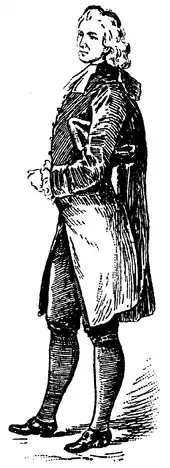Abbé
Abbé (from Latin abbas, in turn from Greek ἀββᾶς, abbas, from Aramaic abba, a title of honour, literally meaning "the father, my father", emphatic state of abh, "father")[1] is the French word for an abbot. It is the title for lower-ranking Catholic clergy in France.[2]

History
A concordat between Pope Leo X and King Francis I of France (1516)[3] gave the kings of France the right to nominate 255 commendatory abbots (abbés commendataires) for almost all French abbeys, who received income from a monastery without needing to render service, creating, in essence, a sinecure.[4]
From the mid-16th century, the title of abbé has been used in France for all young clergy, with or without consecration.[2] Their clothes consisted of black or dark violet robes with a small collar, and they were tonsured.[4]
Since such abbés only rarely commanded an abbey, they often worked in upper-class families as tutors, spiritual directors, etc.;[2] some (such as Gabriel Bonnot de Mably) became writers.[4]
Clerical oblates and seminarians of the Institute of Christ the King Sovereign Priest also have the honorific title of abbé.
See also
Notes
- Harper, Douglas. "abbot". Online Etymology Dictionary.
- A'Becket 1913.
- A'Becket 1913 cites Herbermann, Charles, ed. (1913). . Catholic Encyclopedia. New York: Robert Appleton Company. III under Kinds of Abbot
- Rines, George Edwin, ed. (1920). . Encyclopedia Americana.
References
- A'Becket, John J (1913). . In Herbermann, Charles (ed.). Catholic Encyclopedia. New York: Robert Appleton Company.
External links
- . The Nuttall Encyclopædia. 1907.
- . Collier's New Encyclopedia. 1921.